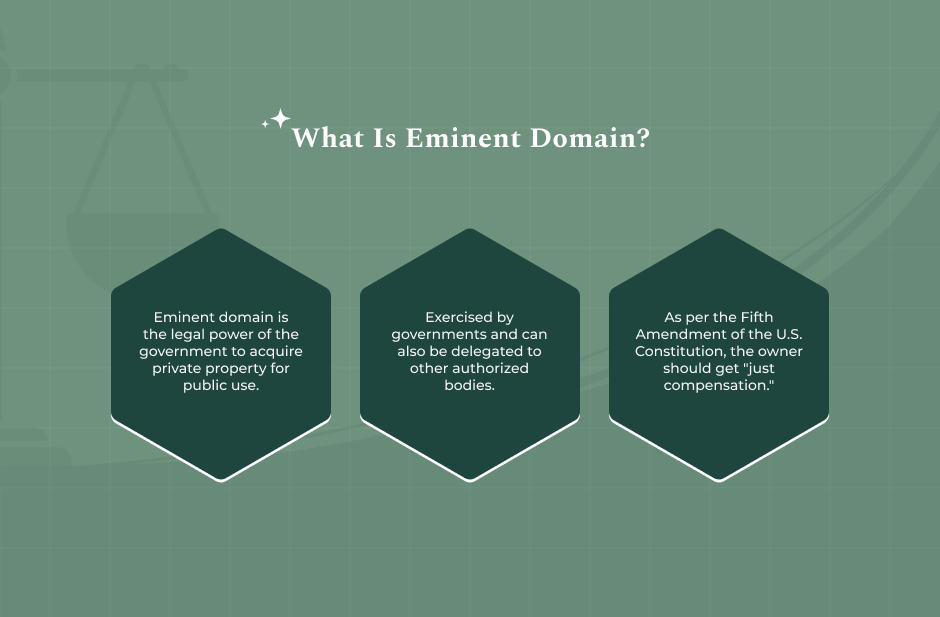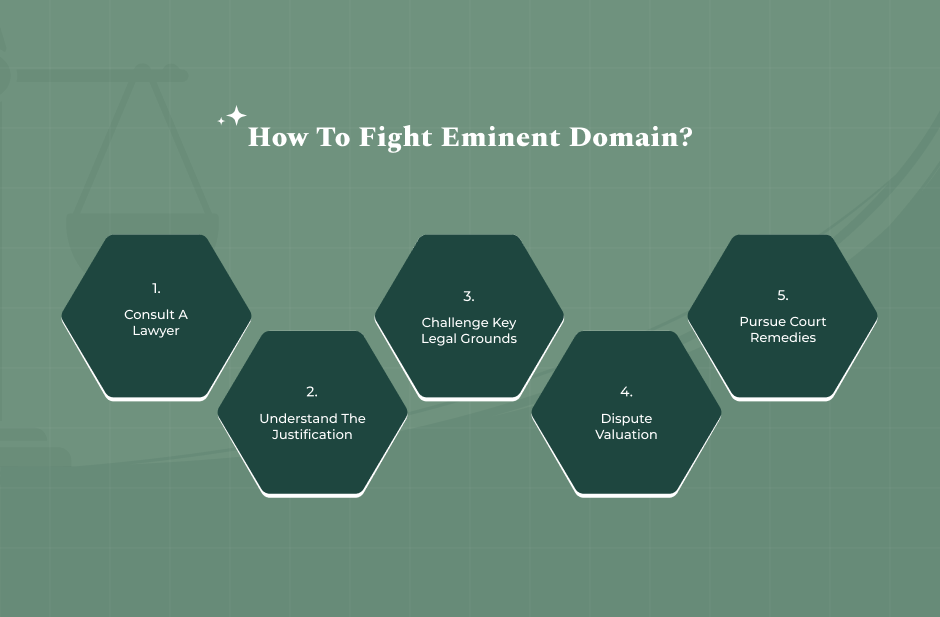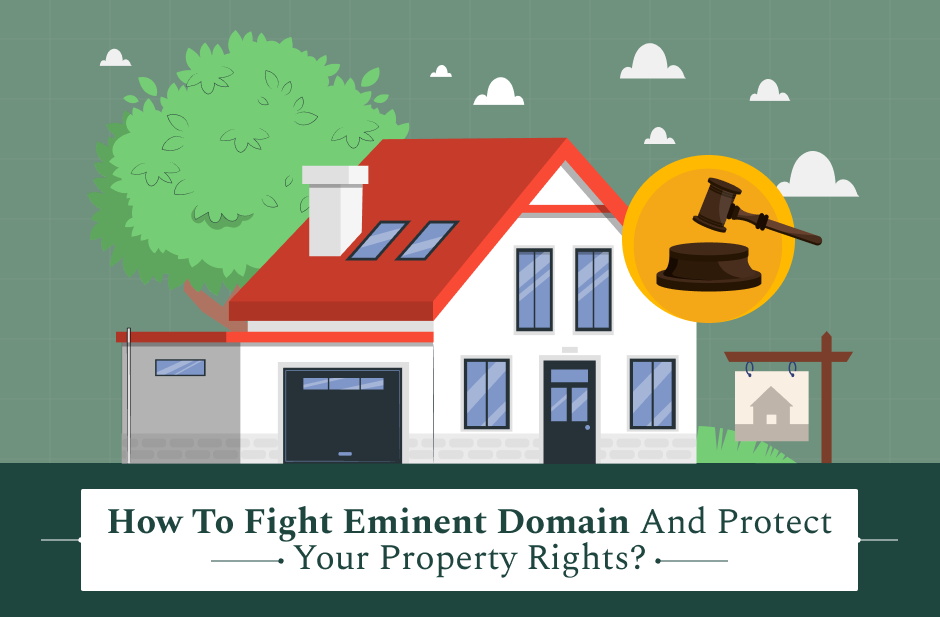As a property owner, eminent domain can feel like an uncompromising force, as it is the government’s power to take private property for public use. But property owners do have rights and legal recourse.
In this article, I will explain:
- What eminent domain is.
- How does it affect your property rights?
- How to fight eminent domain?
Additionally, I will also explain the role a lawyer, like an NC eminent domain attorney, plays in defending your interests. So, if these are the things that you want to know about, keep on reading till the end…
What Is Eminent Domain?

Eminent domain grants governments (and sometimes delegated entities like utilities) the authority to take private property for a public purpose, provided “just compensation” is offered—anchored in the Fifth Amendment of the U.S. Constitution.
Expert legal platforms like Super Lawyers clearly state that “the government shall not take private property for public use without paying just compensation — that’s a rephrase of the Fifth Amendment.”
In other words, the Fifth Amendment tightly restricts the government’s power of eminent domain in two ways:
- Firstly, private property can be appropriated only for “public use,” meaning any utilization that would benefit the community, such as the construction of roads and bridges.
- Secondly, the person from whom the property is taken for a public use must be given “just compensation,” i.e., money equal to the value of the property.
There are two main types of taking:
- Direct condemnation: The government intentionally acquires property—for example, for roads or utility easements.
- Inverse condemnation: Occurs when property is taken (or its value significantly impaired) without formal condemnation or adequate compensation.
Historically, cases like Berman v. Parker (1954) upheld government takings for public purposes with compensation.
However, the landmark Kelo v. New London (2005) expanded “public use” to include economic development, spurring widespread legislative reforms in the majority of states.
How Does Eminent Domain Impact Your Property Rights?
When eminent domain is invoked, property owners face loss of control over their land, often with short timelines and complex valuation processes.
While the Constitution ensures compensation for “public use,” the scope of what qualifies can be broad and contentious—especially after the Kelo v. New London decision.
Common impacts include:
- Disputes over fair compensation: Initial offers may fall below fair market value.
- Community and emotional disruption: Families or businesses forced to relocate.
- Procedural pitfalls: Missing deadlines or failing to respond can waive rights.
- Potential abuse for private gain: Projects may primarily benefit private entities under a public-use pretext.
Can You Fight Eminent Domain?
Even though it might seem challenging sometimes, it is possible for you to fight eminent domain and how it affects your property rights legally under certain circumstances.
While you might not be able to refuse outright, property owners can dispute the taking or the compensation offered. While talking to Consumer Notice, LLC, Rhonda Fisher, who is a licensed real estate broker, said:
“Theoretically, it’s possible for an eminent domain lawyer to block a government’s condemnation. But you would have to prove the reasons that the government is taking the property don’t meet the requirements for public necessity or public use.”
Some of the potential defenses that you can take when it comes to dealing with eminent domains include:
- Lack of genuine public use or necessity.
- Procedural errors—such as improper notice or failure to negotiate in good faith.
- Grossly inadequate compensation.
- Abuse of power or bad faith actions by the condemning authority.
If you want to know how to fight eminent domain, I have explained some of the steps you can take below.
How To Fight Eminent Domain Legally?

According to Fisher, dealing with real estate is sometimes a very complicated matter, and the power of eminent domain is just one of those things.
“I would highly suggest that any owner receiving a notice of intent to take the property get in touch with a qualified attorney. There is a time to respond, and the complexities of the law may change depending on where a person lives,” she added.
Here are some of the steps that you can take if you want to challenge eminent domain legally:
1. Act swiftly and consult an experienced attorney: You’ll need guidance on deadlines, procedures, and negotiating strategies.
2. Understand the justification: Examine government notices and demands to evaluate the stated public purpose.
3. Challenge key legal grounds:
- Public use: argue the project doesn’t serve a genuine public interest.
- Necessity: show alternative solutions that exist that avoid your property.
- Procedural lapses: note any failures in required negotiation, notice, or appraisal.
4. Dispute valuation: Use independent appraisals and expert testimony to argue for a higher valuation.
5. Pursue court remedies: Seek injunctive relief (to stop the taking) and/or fair compensation through litigation.
6. Engage public and policy efforts: Mobilize community support, publicize your case, and advocate for legislative reform—organizations like the Castle Coalition and Institute for Justice offer assistance.
How Can A Lawyer Help You To Fight Eminent Domain?
An eminent domain attorney can be your essential tool:
- Control the complicated aspects: Lawyers are knowledgeable about statutory timelines, notice requirements, and procedural defenses.
- Create a professional team: They can provide appraisers, brokers, and other experts to argue against the valuation proficiently.
- Manage the negotiation or litigation process: Through the negotiation with government representatives, your attorney will not only facilitate the process but also reduce your stress and thus increase your comfort level.
- Discover the legal basis: Attorneys, through the misuse of eminent domain, defective procedures, and inadequate compensation, can identify and challenge the alleged violations.
Additionally, these lawyers will be able to legally defend you in court. In case it is injunctions or valuation hearings, a lawyer will be there to make your case heard in the most effective way possible.
Read Also: What Every Homebuyer in Spruce Grove Should Know About Real Estate Contracts
Your Legal Guide: What Are The Legal Grounds For Fighting Eminent Domain?
If you want to challenge the right of eminent domain, then you probably have several legal grounds to do so. The main legal defenses you can raise are as follows:
- Lack of valid public use: The project is helping the private owners instead of meeting the public’s needs.
- Lack of importance: Prove that the property is not vital—there are substitutes available.
- Procedural violations: Those may be insufficient notification, the lack of a proper negotiation, or skipping appraisals required by law.
- Lowball compensation: Claim the government has undervalued your property; seek fair market value.
- Power and/or bad faith abuse: When taking actions appear to be for private benefit or are done wrong.
- State constitutional protections: For example, after the Norwood v. Horney (Ohio Supreme Court, 2006) decision, some states like Ohio reject the argument that economic benefit alone is the justification for eminent domain cases.
















